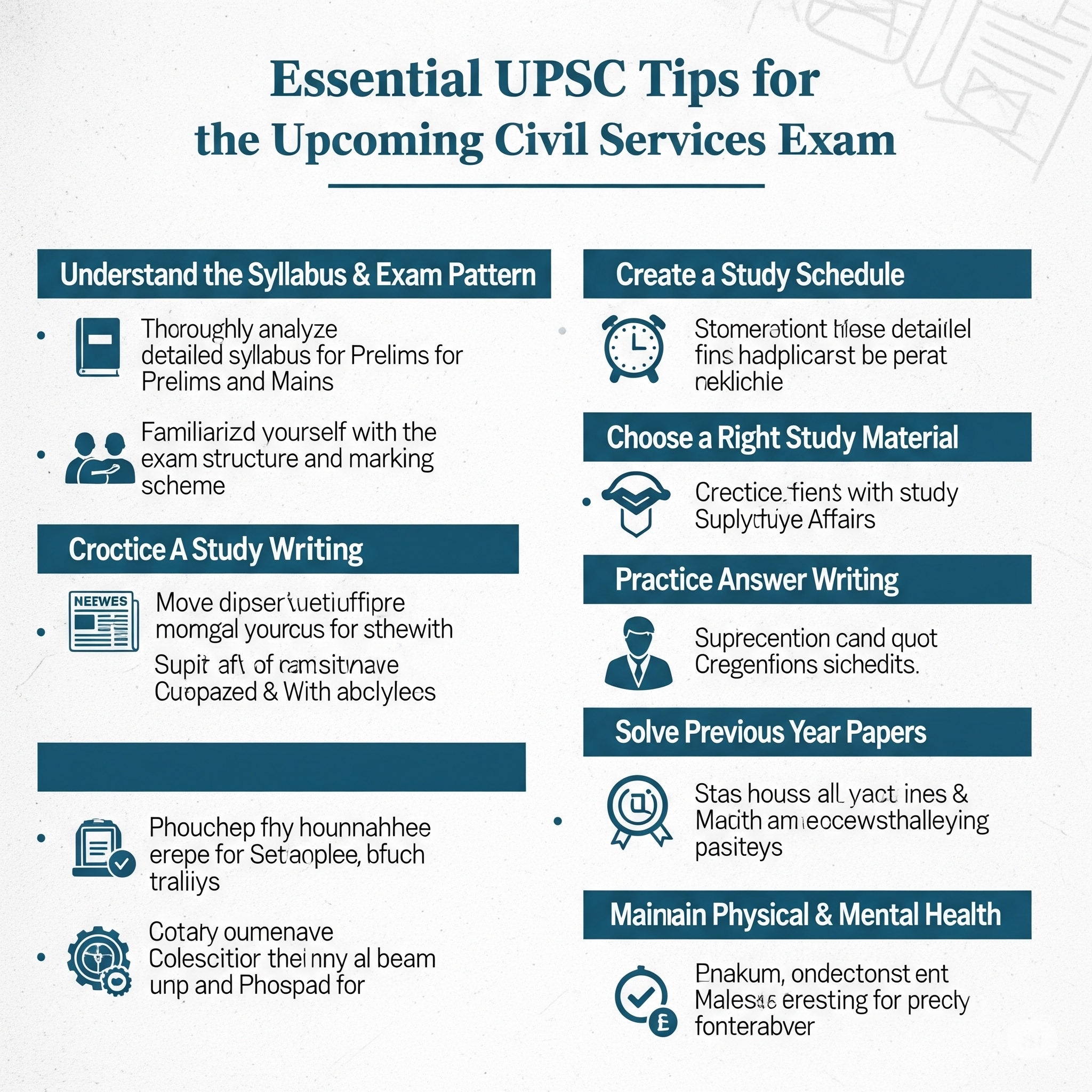
Key Highlights
- UPSC preparation demands an integrated approach to both static and dynamic portions of the syllabus, with special focus on current affairs.
- Staying updated on national and international current events is crucial for exam scoring and interview success.
- Revision techniques like structured note-making, mind maps, and flashcards can greatly enhance retention. A smart exam strategy involves prioritizing topics for news analysis and selecting the best recommended sources for updates. To stay informed about the most important current affairs happening in the world right now, focus on key highlights such as major geopolitical events, global health developments, environmental issues, and significant economic shifts. Tracking these areas ensures your news analysis remains relevant and comprehensive.
- A smart exam strategy involves prioritizing topics for news analysis and selecting the best recommended sources for updates.
- Reliable current affairs resources include top newspapers, magazines, websites, and mobile apps tailored for UPSC. Staying updated on significant recent national and international events—such as major elections, economic policy shifts, climate agreements, and global summits—is crucial for comprehensive current affairs preparation. Being aware of trending interview topics and mastering general studies through effective study plans can boost your civil services exam performance.
- Being aware of trending interview topics and mastering general studies through effective study plans can boost your civil services exam performance.
Let’s move ahead to the introduction, setting the stage for your UPSC exam journey.
Introduction
The journey toward the UPSC civil services exam is both challenging and rewarding, demanding a strategic approach to preparation. Focusing on key areas such as current affairs and syllabus components is crucial, as these directly impact candidates’ performance. Emphasizing effective study techniques and revision methods can significantly enhance retention and comprehension. As aspirants engage with the vast ocean of information, mastering smart strategies tailored to navigate through this complexity will ultimately pave the way for success in the exam.
Key Areas to Focus On for UPSC 2025 Preparation
Comprehensive knowledge of key areas is vital for effective UPSC 2025 preparation. Current affairs should command significant attention, given their influence on both static and dynamic syllabus aspects. Additionally, understanding foundational concepts is crucial to develop analytical skills necessary for the exam. Integrating revision techniques, like strategic summarization and active recall, can also greatly enhance retention. Prioritizing these focus areas will ensure a well-rounded approach, boosting confidence and performance on this competitive journey.
Importance of Current Affairs in UPSC
Current affairs play a pivotal role in UPSC preparations, shaping candidates’ understanding of the world. Staying informed about recent developments helps in contextualizing static portions of the syllabus, ensuring a more cohesive grasp of subjects. Moreover, these updates enhance analytical thinking and improve situational awareness essential for the exam’s dynamic nature. Engaging with current events also fosters critical reasoning, enabling aspirants to formulate structured arguments during both written tests and interviews, ultimately impacting their success.
Static vs Dynamic Syllabus Components
Static components of the syllabus encompass fundamental concepts that remain unchanged, providing a necessary foundation for aspirants. These include subjects like history, geography, and polity, which are essential for developing a comprehensive understanding of the nation’s framework. In contrast, dynamic components reflect current affairs and emerging global trends, requiring candidates to stay informed about recent developments. Navigating this interplay ensures that aspirants are well-prepared to tackle questions that integrate both established knowledge and contemporary issues, essential for success in the UPSC examination.
Smart Strategies for Covering Current Affairs
Developing an efficient routine for current affairs coverage can significantly enhance exam preparedness. Incorporating a time-blocking technique allows for focused sessions dedicated to specific news sources. Utilizing the Feynman technique can also aid in understanding complex topics through simplified explanations. Engaging in social listening provides context on trending issues, thereby improving analytical skills. With the incorporation of spaced repetition, candidates can create retention strategies that ensure long-term recall of crucial information, enhancing overall performance in the UPSC exam.
Daily and Weekly News Overview Methods
Incorporating a structured routine for daily and weekly news overviews can significantly enhance comprehension and retention. Start with digestible formats, such as summaries and bullet points, focusing on key details that align with UPSC syllabus requirements. Utilizing NLP techniques, like spaced repetition, allows for better recall during revision sessions. A weekly synthesis of news can help draw connections between various events, promoting critical thinking. This method not only keeps candidates informed but also enriches their analytical skills essential for the exam.
Prioritizing Topics for News Analysis
Effective news analysis hinges on prioritizing topics that resonate with both current trends and UPSC syllabus requirements. Investigating areas such as governance, economics, and international relations can enhance your understanding of complex issues. Utilizing tools like keyword relevance and sentiment analysis allows aspirants to discern which topics hold the most significance. Balancing the coverage of dynamic aspects while ensuring a solid grasp on static components ultimately equips candidates with a comprehensive perspective essential for exam success.
Top Sources for UPSC Current Affairs Updates
A diverse array of sources enriches your UPSC preparation by providing comprehensive insights into current affairs. Newspapers like The Hindu and Indian Express offer in-depth analyses, while magazines such as Frontline present a broader context. Digital platforms like Press Information Bureau (PIB) and News on Air keep candidates updated with factual information. Utilizing apps such as UPSC Pathshala integrates advanced learning techniques, ensuring seamless retention of crucial data. Expanding your media consumption not only enhances knowledge but also nurtures analytical thinking.
Recommended Newspapers, Magazines & Websites
Staying updated with credible sources is essential for UPSC aspirants. Notably, newspapers like “The Hindu” and “Indian Express” provide comprehensive coverage of national and international events. Monthly magazines such as “Kurukshetra” and “Yojana” offer in-depth analyses on socio-economic issues, while platforms like “PRS Legislative Research” enhance understanding of policy-making. Additionally, websites such as “DownToEarth” and “Live Mint” filter significant news relevant to civil services, ensuring aspirants capture dynamic developments essential for exam preparation.
Digital Tools and Mobile Apps to Enhance Preparation
Utilizing digital tools and mobile apps can significantly streamline UPSC preparation. Apps like Magoosh and Unacademy provide tailored content and interactive quizzes, enhancing your learning experience. Moreover, resources such as Google Drive allow for efficient storage and organization of study materials. Integration of flashcard apps like Quizlet encourages active recall, a key technique in memory retention. Regular use of these technologies can facilitate a more adaptive learning environment, ultimately improving your performance and efficiency in studying current affairs.
Effective Techniques for Revising and Retaining Information
Incorporating effective techniques to revise and retain information can significantly enhance preparation outcomes. Utilizing note-making best practices allows for the organization of thoughts, facilitating memory retention through cognitive reinforcement. Techniques such as mind maps and flashcards provide visual stimuli that strengthen neural connections, making recall easier. Establishing a structured revision schedule promotes spaced repetition, a vital mechanism in solidifying memory pathways. By integrating these strategies, aspirants can optimize their study sessions and ensure comprehensive mastery of essential content.
Note-Making Best Practices for UPSC
Effective note-making begins with active listening and critical engagement with the material. Utilize a structured format, such as the Cornell method, to organize information logically and enhance retention. Summarization plays a crucial role, allowing the distillation of complex topics into digestible points. Incorporate keywords and mnemonic devices to boost recall. Regularly review and revise notes to reinforce learning pathways in your brain, ensuring concepts remain connected and easily accessible during study sessions. Embrace this iterative approach for lasting success.
Mind Maps, Flashcards, and Revision Schedules
Incorporating mind maps into your study routine fosters a visual understanding of complex concepts, enhancing cognitive recall. These diagrams enable connections between ideas, effectively utilizing the brain’s natural information processing capabilities. Flashcards serve as practical tools for active recall, making it easier to remember key facts and definitions. Complementing these methods with structured revision schedules promotes systematic learning, ensuring comprehensive coverage and timely revision, ultimately aiding in the retention of important UPSC-related information.
Impact of Recent National and International Events on Exam Trends
Recent national and international events profoundly shape trends in the UPSC examination. Understanding the dynamics of these occurrences allows aspirants to grasp their implications for India’s socio-political landscape. Key events often serve as case studies during interviews and discussions, indicating their significance. Staying informed not only aids in analytical reasoning but also enriches one’s comprehension of the interconnectedness of global issues and their local relevance. This holistic awareness is crucial for success in both the written exam and personality assessment.
Influential Global Issues and Their Relevance to India
Understanding influential global issues is crucial for aspirants, as they often shape India’s policy decisions and diplomatic relations. Topics such as climate change, international trade dynamics, and geopolitical tensions not only highlight India’s role on the global stage but also impact national priorities. Familiarity with these issues enhances analytical thinking, allowing candidates to connect theoretical knowledge with real-world implications. Engaging with these subjects strengthens the ability to discuss and critically evaluate India’s responses to global challenges in the examination setting.
Interview and Group Discussion Hot Topics
Familiarity with contemporary issues enhances candidates’ performance during interviews and group discussions. Recent developments in climate change, international relations, and socio-economic reforms often become focal points. Understanding these subjects allows for nuanced responses and demonstrates a well-rounded perspective. Additionally, analyzing the implications of national policies on India’s global standing can provide significant insights. Engaging in discussions on these topics showcases critical thinking, a key competency evaluated in the civil services selection process. Stay abreast to make a lasting impression!
Conclusion
Success in the UPSC exam hinges on a strategic preparation approach. Mastering the balance between current affairs and traditional syllabus components allows candidates to optimize their learning experiences. Additionally, leveraging effective revision techniques, such as mind maps and flashcards, enhances information retention. Staying informed about contemporary national and international events is crucial for collective knowledge building. Ultimately, resilience, adaptability, and a well-structured study plan are vital for achieving the desired outcomes and navigating the complexities of the exam.
Frequently Asked Questions
How can I stay consistent with current affairs preparation?
To stay consistent with current affairs preparation, establish a daily routine that includes reading newspapers and designated magazines. Set aside specific times for news summary reviews and utilize digital tools or apps to track topics, ensuring regular engagement without overwhelming yourself.
What are the most likely current affairs topics for UPSC interviews?
Current affairs topics for UPSC interviews often revolve around recent national and global events, government policies, socio-economic issues, environmental challenges, and international relations. Candidates should stay updated on these areas to demonstrate awareness and analytical skills during discussions.
Are dedicated current affairs magazines necessary for UPSC success?
Dedicated current affairs magazines can significantly enhance your UPSC preparation. They provide curated, comprehensive insights into important events and issues, helping you stay updated efficiently. While not mandatory, their structured content aids in effective revision and understanding of complex topics relevant for the exam.
https://bit.ly/CCAPP-ACContentLink
https://bit.ly/CCAPP-ACContentLink
https://apnews.com/article/gildan-hanesbrands-hanes-maidenform-57b14618d7611f4a644af4150049502e
https://apnews.com/article/gildan-hanesbrands-hanes-maidenform-57b14618d7611f4a644af4150049502e
https://apnews.com/article/gildan-hanesbrands-hanes-maidenform-57b14618d7611f4a644af4150049502e
https://apnews.com/article/gildan-hanesbrands-hanes-maidenform-57b14618d7611f4a644af4150049502e

1 thought on “Essential UPSC Tips for the Upcoming Civil Services Exam”